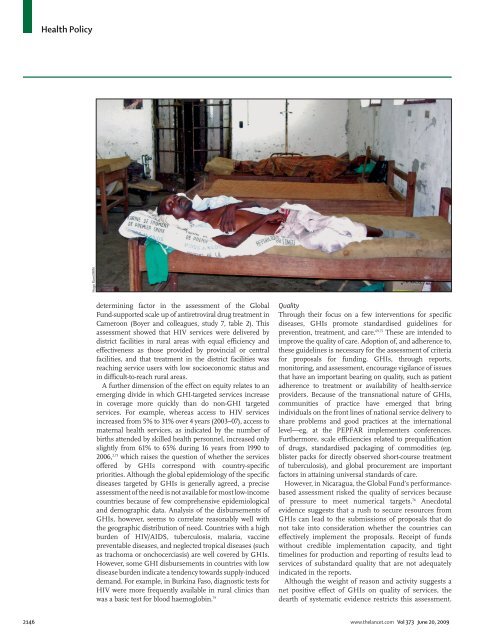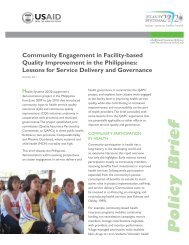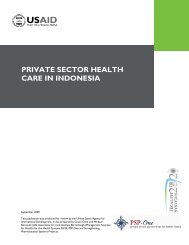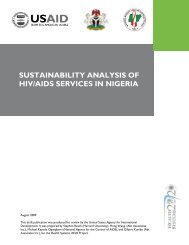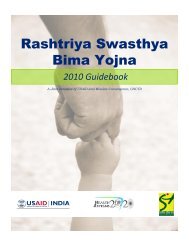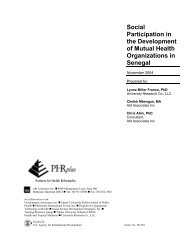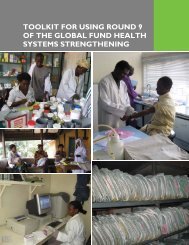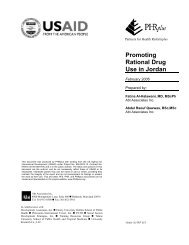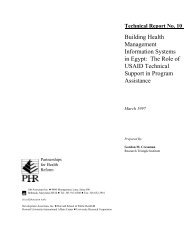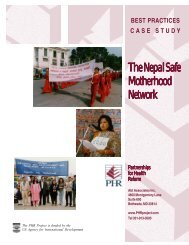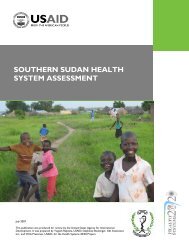An assessment of interactions between global ... - ResearchGate
An assessment of interactions between global ... - ResearchGate
An assessment of interactions between global ... - ResearchGate
You also want an ePaper? Increase the reach of your titles
YUMPU automatically turns print PDFs into web optimized ePapers that Google loves.
Health Policy<br />
Hugo Rami/IRIN<br />
determining factor in the <strong>assessment</strong> <strong>of</strong> the Global<br />
Fund-supported scale up <strong>of</strong> antiretroviral drug treatment in<br />
Cameroon (Boyer and colleagues, study 7, table 2). This<br />
<strong>assessment</strong> showed that HIV services were delivered by<br />
district facilities in rural areas with equal efficiency and<br />
effectiveness as those provided by provincial or central<br />
facilities, and that treatment in the district facilities was<br />
reaching service users with low socioeconomic status and<br />
in difficult-to-reach rural areas.<br />
A further dimension <strong>of</strong> the effect on equity relates to an<br />
emerging divide in which GHI-targeted services increase<br />
in coverage more quickly than do non-GHI targeted<br />
services. For example, whereas access to HIV services<br />
increased from 5% to 31% over 4 years (2003–07), access to<br />
maternal health services, as indicated by the number <strong>of</strong><br />
births attended by skilled health personnel, increased only<br />
slightly from 61% to 65% during 16 years from 1990 to<br />
2006, 2,73 which raises the question <strong>of</strong> whether the services<br />
<strong>of</strong>fered by GHIs correspond with country-specific<br />
priorities. Although the <strong>global</strong> epidemiology <strong>of</strong> the specific<br />
diseases targeted by GHIs is generally agreed, a precise<br />
<strong>assessment</strong> <strong>of</strong> the need is not available for most low-income<br />
countries because <strong>of</strong> few comprehensive epidemiological<br />
and demographic data. <strong>An</strong>alysis <strong>of</strong> the disbursements <strong>of</strong><br />
GHIs, however, seems to correlate reasonably well with<br />
the geographic distribution <strong>of</strong> need. Countries with a high<br />
burden <strong>of</strong> HIV/AIDS, tuberculosis, malaria, vaccine<br />
preventable diseases, and neglected tropical diseases (such<br />
as trachoma or onchocerciasis) are well covered by GHIs.<br />
However, some GHI disbursements in countries with low<br />
disease burden indicate a tendency towards supply-induced<br />
demand. For example, in Burkina Faso, diagnostic tests for<br />
HIV were more frequently available in rural clinics than<br />
was a basic test for blood haemoglobin. 74<br />
Quality<br />
Through their focus on a few interventions for specific<br />
diseases, GHIs promote standardised guidelines for<br />
prevention, treatment, and care. 69,75 These are intended to<br />
improve the quality <strong>of</strong> care. Adoption <strong>of</strong>, and adherence to,<br />
these guidelines is necessary for the <strong>assessment</strong> <strong>of</strong> criteria<br />
for proposals for funding. GHIs, through reports,<br />
monitoring, and <strong>assessment</strong>, encourage vigilance <strong>of</strong> issues<br />
that have an important bearing on quality, such as patient<br />
adherence to treatment or availability <strong>of</strong> health-service<br />
providers. Because <strong>of</strong> the transnational nature <strong>of</strong> GHIs,<br />
communities <strong>of</strong> practice have emerged that bring<br />
individuals on the front lines <strong>of</strong> national service delivery to<br />
share problems and good practices at the international<br />
level—eg, at the PEPFAR implementers conferences.<br />
Furthermore, scale efficiencies related to prequalification<br />
<strong>of</strong> drugs, standardised packaging <strong>of</strong> commodities (eg,<br />
blister packs for directly observed short-course treatment<br />
<strong>of</strong> tuberculosis), and <strong>global</strong> procurement are important<br />
factors in attaining universal standards <strong>of</strong> care.<br />
However, in Nicaragua, the Global Fund’s performancebased<br />
<strong>assessment</strong> risked the quality <strong>of</strong> services because<br />
<strong>of</strong> pressure to meet numerical targets. 76 <strong>An</strong>ecdotal<br />
evidence suggests that a rush to secure resources from<br />
GHIs can lead to the submissions <strong>of</strong> proposals that do<br />
not take into consideration whether the countries can<br />
effectively implement the proposals. Receipt <strong>of</strong> funds<br />
without credible implementation capacity, and tight<br />
timelines for production and reporting <strong>of</strong> results lead to<br />
services <strong>of</strong> substandard quality that are not adequately<br />
indicated in the reports.<br />
Although the weight <strong>of</strong> reason and activity suggests a<br />
net positive effect <strong>of</strong> GHIs on quality <strong>of</strong> services, the<br />
dearth <strong>of</strong> systematic evidence restricts this <strong>assessment</strong>.<br />
2146 www.thelancet.com Vol 373 June 20, 2009


